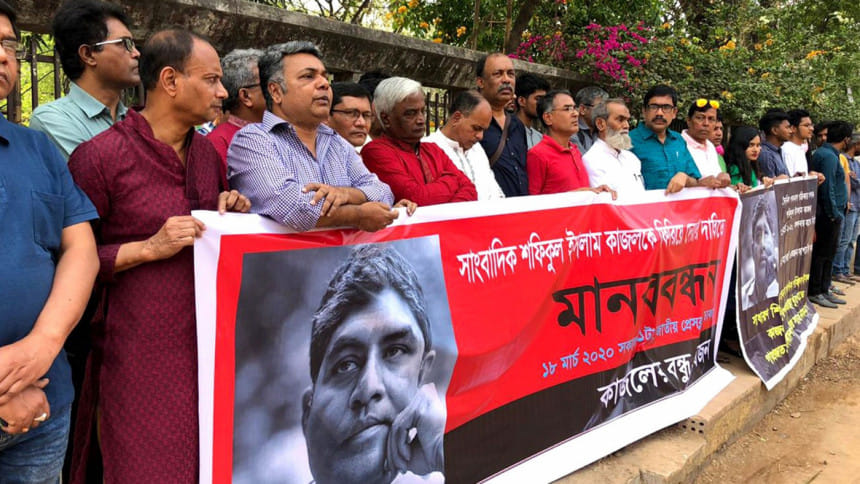COVID-19 must not be a pathogen of repression

As COVID-19 spreads, repression and disinformation have generally followed in its wake. Governments around the world are justified in their concern that the pandemic is being exploited by some to spread dangerous misinformation about the disease and means to cure it, potentially harming the efforts to combat it. At the same time, however, some governments are themselves exploiting this moment—to suppress relevant information uncomfortable for the government or use the situation as a pretext to crackdown on critical voices.
A week short of two months since journalist Shafiqul Islam Kajol disappeared, police today has confirmed having him in custody. It is without doubt a relief to know that he is alive and in police custody. Since COVID-19 began taking a toll on the people in the country, Kajol's 11-year-old daughter and 20-year-old son not only just worried for their father's safety but worried about his health as well, anxious about whether the virus may have infected him too.
A photojournalist and editor of a daily newspaper, Kajol was also facing the prospect of charges under the draconian Digital Security Act. A day before he was disappeared, a lawmaker from the ruling Awami League accused him of publishing "false, offensive and defamatory" material on Facebook. Three hours after he was last seen, another case was filed against him, under the same act, by a member of the ruling party.
Since the COVID-19 pandemic has come to dominate the news, people who have been critical of the government's response have found themselves subject to hostile attention from the authorities. On April 26, an op-ed that questioned why the government had failed to procure low-cost testing kits suddenly vanished from the website it was published on.
Netra News, a Sweden-based platform for investigative journalism, edited by journalist and researcher Tasneem Khalil, reported on a leaked UN internal memo that estimated Bangladesh could see as many as two million deaths as a result of the pandemic without interventions. Netra News' own website has been inaccessible to readers in Bangladesh ever since it reported allegations of corruption involving high-ranking officials, Khalil told Amnesty International. Now, its mirror website has been blocked, too, as was that of BenarNews, an online affiliate of Radio Free Asia, which carried the Netra News report.
Khalil, who is based outside Bangladesh, said that members of an intelligence agency visited on April 9 the home of his mother and warned her that he was "tarnishing the image of the country". At least 20 journalists have been recently intimidated, assaulted or harassed by members of the ruling party, and in some cases detained and accused of criminal offences by the police for reporting pilferage, corruption and lack of accountability in the relief distribution meant for the poor during the lockdown in the country, noted Forum for Freedom of Expression, Bangladesh.
The police registered a case on April 17 against four journalists, including the editor of bdnews24.com, Toufique Imrose Khalidi, citing "deteriorating law and order" and "false, offensive and defamatory content" after they published allegations that relief funds were being misappropriated.
In the meantime, signed on a letterhead on April 12, the Association of Television Channel Owners issued a notice conveying a "request" from the Ministry of Information to avoid "all negative discussion and criticisms" about COVID-19.
As noted by David Kaye, the UN Special Rapporteur on the promotion and protection of the right to freedom of opinion and expression, in his report to the UN Human Rights Council on April 23, many governments are seeking to restrict access to information without meeting the basic conditions of legality or necessity. The pandemic, Kaye warned, has led to several incidents of journalists and human rights defenders around the world being intimidated, detained, questioned and harassed for their work.
Social media users in Bangladesh are also being ensnared, targeted for posting comments online about the pandemic. At least 50 people now face criminal allegations of spreading "false news" and "rumours". Some Muslim religious leaders in Bangladesh, who have been telling people that they are immune from the virus by virtue of their piety, are unfortunately hardly contested by the authorities for such misinformation that can put lives of people at risk.
The incidents described here demonstrate deeply troubling layers of repression exercised by authorities and people in positions of power. The Digital Security Act criminalises legitimate forms of expression under vague and overbroad provisions. There is no clarity about how Khalidi and other journalists could have "deteriorated law and order" by simply publishing a report about misappropriation of relief materials. The journalists, if convicted under the charges they have been accused of, could face up to seven years in prison.
Several cases under the Digital Security Act registered before and during COVID-19 have used defamation charges as the pretext to stop allegedly false or malicious accusations against politicians and State institutions. In the process, people have been faced with prison sentences of up to 5 years simply for expressing their opinions of people in power. Human rights standards are clear that, when a person claims that their honour or reputation has been damaged, it should be treated as a civil matter, not a criminal one.
The growing number of cases filed against journalists and social media users during COVID-19 simply for exercising their right to freedom of expression are anything but rights-respecting. Any restriction on the right to freedom of expression must be provided by law and be necessary and proportionate to a pressing social need, as clearly established by the International Covenant on Civil and Political Rights, to which Bangladesh is a state party.
It is important that authorities urgently respond to dispel disinformation or any rapid spread of rumours, gossip or unreliable information, to protect communities and public health but a disproportionate penalisation hardly meets the objective. Instead, the authorities should invest into promoting access to prompt, reliable, evidence-based and trustworthy information. This is a more effective way to protect public health and ensure that people have a better chance of being able to stay aware of the measures that are being taken to protect public health, address the pandemic and abandon rumours.
Saad Hammadi is Regional Campaigner for South Asia at Amnesty International. His Twitter handle is: @saadhammadi

 For all latest news, follow The Daily Star's Google News channel.
For all latest news, follow The Daily Star's Google News channel. 



Comments